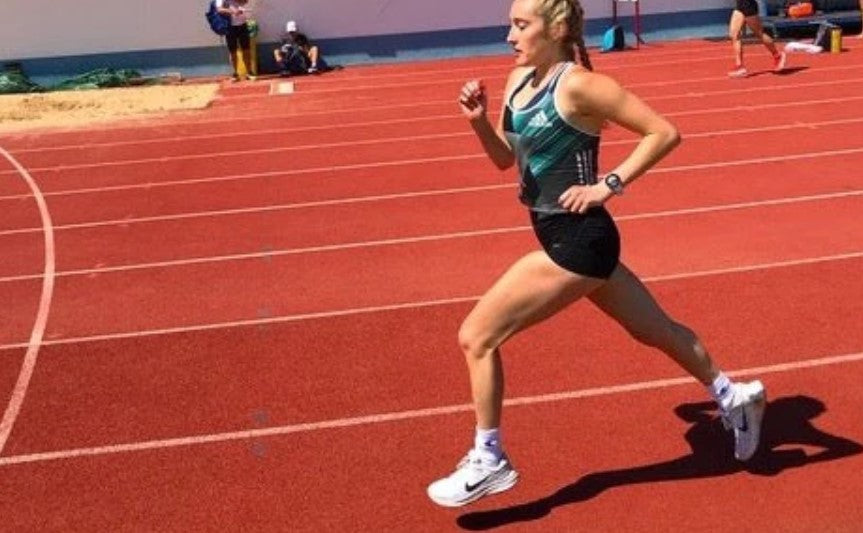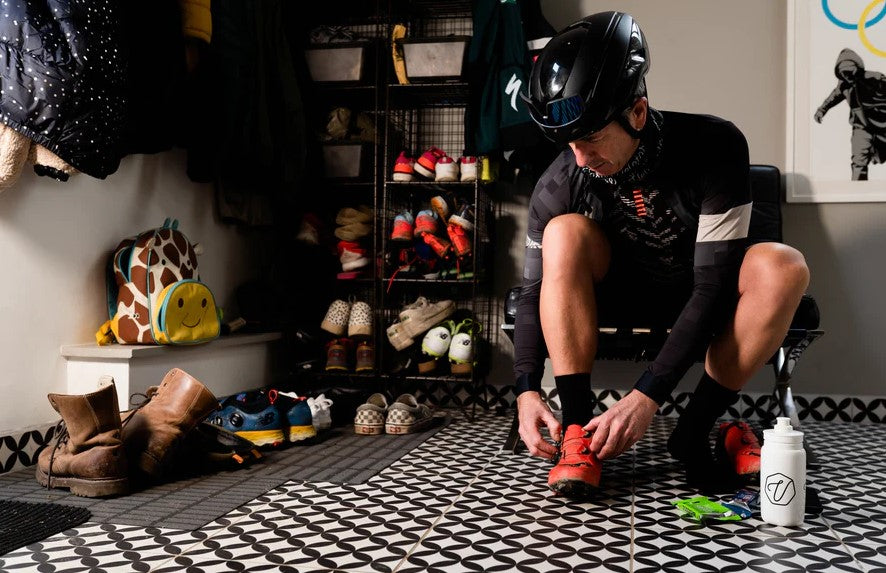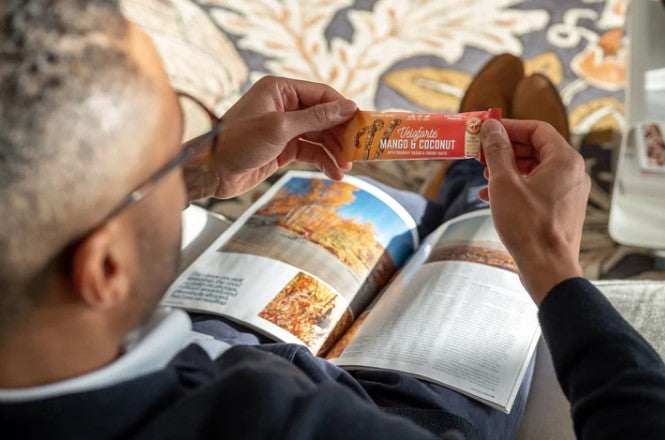Gluten-Free Sports Nutrition: How Veloforte Helps Fuel My Active Lifestyle & Performance

Natalia H. is a doctor and runner. Here's her story, from childhood cross country success to her coeliac diagnosis, and how fuelling with real food has helped her return to the sport she loves.
I started running when I was thirteen years old. My best friend had encouraged me to join her in a city inter schools league cross country race.
So, one Saturday morning after a football match, which was my main sport at the time, I raced around some muddy fields. It was exhausting and painful, and I felt as though I couldn’t feel my arms or legs for the last few minutes, but it was exhilarating, I loved hearing the cheers of encouragement, the feeling of the cold wind across my legs, the peacefulness of the rhythmic crunching of the ground beneath my feet.
I laid on the floor when I crossed the line and said I’d never do that again. Nevertheless, the following Saturday I was back toeing the line ready to give everything I’d got.
I enjoyed pretty much every sport I’ve ever tried but running seemed to come particularly naturally to me. I felt as though I could just go and go.
There was something so peaceful about running, it made me be mindful without having to consciously try to be. When your fitness improves a bit, and you feel as though you're flying, that’s the best feeling ever.
Other times when your legs feel heavy and your chest tight, you can focus on other things such as the smell of the ground or the sound of the birds.
I began to take it more seriously in 2011. The results came fairly quickly. I was reaching and surpassing my targets, achieving things my younger self had only ever dreamt of.
Like many, I dreamed of the Olympics, and poured my heart into training and racing. But by the start of 2012, things had taken a downward turn.


My diagnosis
I had just qualified to represent England at the World Schools Cross Country Championships, which I was so excited for since the previous time representing my country was so much fun, but the following week I was side-lined for 12 weeks with a fracture in my foot. At the time it all felt pretty sudden, but looking back now, issues had been knocking at the door for a while.
My mother and I had visited the GP a year earlier as I was tired all the time despite getting ample sleep, and then there were the bowel issues. We were dismissed, told that young athletes are often tired and that’s normal and told we only needed to look on any running forum to hear about “runners trots”.
We took this at face value and carried on as normal. It was a bit of a puzzle as to why a seemingly healthy sixteen-year-old, albeit 4ft8, was struggling to grow or gain weight despite eating three bowls of cereal before and three bowls of pasta after a run.
After the fracture, I had several more scans, blood tests and an endoscopy. With that, we had our answer. Coeliac disease.
What is Coeliac disease?
Coeliac disease is an autoimmune condition where your immune system mistakes gluten (found in wheat, barley and rye) as a threat and tries to attack it and in doing so destroys the lining of your intestines so you can’t absorb food properly.
Being an endurance athlete and having an Italian mother, you can probably imagine what my diet consisted of, lots of bread, pasta, pizza etc, none of which I was properly absorbing.
Coeliac disease treatment
The treatment for coeliac disease is a lifelong strict gluten-free diet. Before the ‘free from’ aisles, I had my food on prescription and collected dinner from the local pharmacy! I’d love to be able to say that I had the diagnosis, avoided gluten and got my energy back and my running went from strength to strength.
Sadly, I spent the next ten years enduring the after-effects of being unintentionally malnourished for my childhood. I endeavoured to keep active, but it was a constant battle with my healing body. This was both physically and mentally challenging. Alongside all this, I had begun completing my medical degree.
My breaking point
I have now nearly completed my first year as a junior doctor. I’ve done my first on-call shifts, nights shifts, resuscitations, family discussions and prescriptions.


The first few weeks were very stressful. I was dropped in at the deep end on a busy general surgery unit. Work started early, the pace was fast and the days were long. The team found themselves sometimes not having lunch until 3 or 4pm, not being able to leave the ward to eat or get a moment of rest.
Apace with this, I was still attempting to make some sort of return to competitive running even though in many people's books I’d be considered a write-off.
Alas, I got injured in the early winter. It wasn’t a surprise, but that didn’t make it any less disappointing. I was on my feet all day at work, not eating appropriately, not drinking enough water, stressed and not sleeping enough.
Generally, as I had done all through university, burning the candle at both ends. I had a habit of wanting to do everything, by that I mean, work hard, socialize lots and train like an elite athlete. But of course, something has to give.
Discovering real-food fuelling


I realized that what was the point in me working so hard both in the hospital and in the gym if I was then going to blow it by not recovering properly. Plus, realistically I was never going to be able to string more than a few weeks of training together without breaking down if I didn’t get the simple things right.
However, I found this is easier said than done. I did a bit of research and asked around about how other people aid their recovery or fuel their training.
The research generally suggested that ‘proper’ food is the best way to physically and also mentally to live and recover from activity.
I had tried to do this for so long but realized that applying this to my lifestyle which involved a demanding full-time job with erratic hours, including sometimes working through the night, was just not feasible all the time. I thought I’d try protein shakes or supplements.
Having coeliac disease often means the best shakes or recovery drinks aren’t an option for me as they aren’t certified gluten-free.
I came across Veloforte in my search and haven’t looked back since.

Gluten-free Veloforte products I use
I use Veloforte’s bars, gels and shakes for pre and post-workouts when a ‘meal’ is just not practical. I try and be as organized as I can with meal prep too, but I have my limits!
Veloforte bars feel legitimate, not just compressed sugar, the shakes had the perfect carbs to protein ratio that I wanted, and the gels meant I could have some caffeine and carbs before a workout or race.
Yes, you heard me right, a race!
The proof is in the pudding, or in the protein in this case. I’ve managed to stay healthy and injury free for the longest time in over ten years, I’ve raced again and almost put a whole season together (albeit off a winter of no running but I’m so happy regardless), work is going well and feels less overwhelming, and I have the energy for life outside of work and training too.
For example, I raced a 1500m on the track for the first time in 11 years a few weeks ago, had one of my Doppio gels beforehand, and I felt fantastic, so dialled in and raring to go despite having finished working my shift on-call at 11pm the night before. I hit the target I wanted, and I know there’s more to come for next season and the years to come.


A few points of reflection and advice
-
Find what works for you and your lifestyle.
-
Don’t compromise on nutrition (I use Veloforte to supplement and not to replace).
-
Sleep, nutrition, lowering the stress levels is key (and unsurprisingly, are all connected).
-
Fuel better, train smarter, live life to the full.
-
And don’t be more organized than you need to be, just remember to get your snack orders in!
-
My favourites - Doppio gel, Mocha or Avanti bar, Nova shake.




